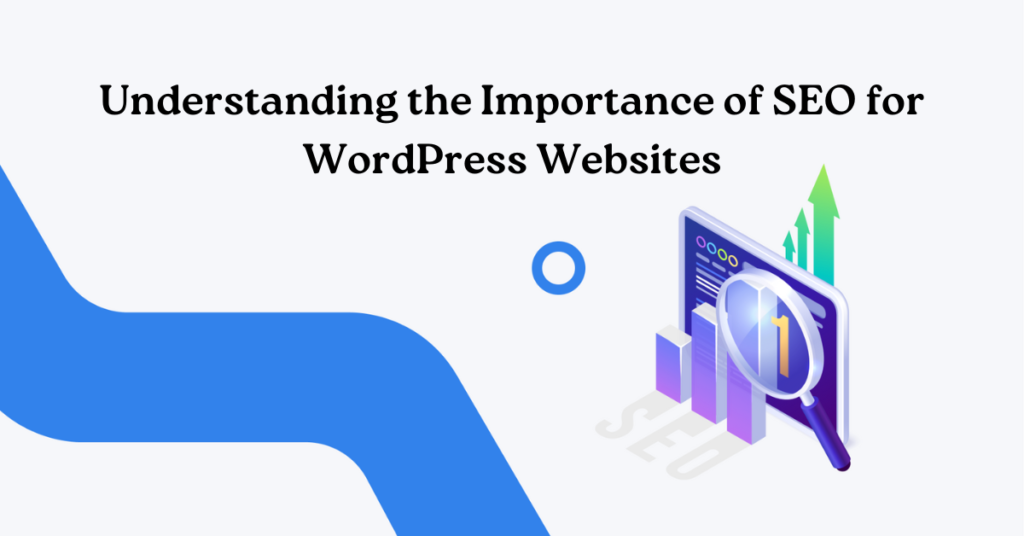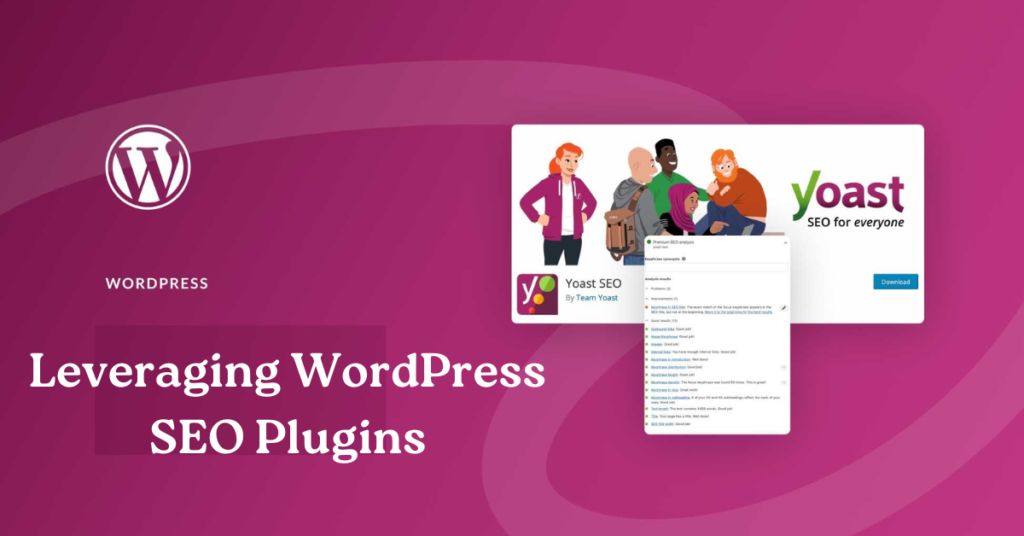In today’s digital landscape, where the online presence reigns supreme, the significance of Search Engine Optimization (SEO) cannot be overstated. For WordPress websites, in particular, harnessing the power of SEO is paramount to achieving visibility, attracting organic traffic, and ultimately, realizing your online goals. In this comprehensive guide, we’ll explore the ins and outs of SEO optimization on WordPress, equipping you with the knowledge and tools necessary to propel your website to new heights.
Understanding the Importance of SEO for WordPress Websites

At its core, SEO for WordPress revolves around enhancing your website’s visibility in search engine results pages (SERPs). By optimizing various elements of your WordPress site, you can improve its chances of ranking higher for relevant keywords and phrases. This heightened visibility translates to increased organic traffic, improved user engagement, and enhanced conversion rates.
Crafting an SEO-Friendly WordPress Site
The journey to SEO success on WordPress begins with laying a solid foundation. Choosing the right WordPress theme is crucial, as it sets the stage for your site’s overall SEO performance. Opt for themes that are lightweight, responsive, and optimized for speed, as these factors play a significant role in search engine rankings.
Next, pay close attention to your site’s permalink structure. Optimize your URLs to be descriptive, concise, and keyword-rich, as this not only improves readability but also enhances your site’s SEO performance. Additionally, prioritize responsive design to ensure that your site is mobile-friendly—a factor that search engines increasingly prioritize in their ranking algorithms.
On-Page SEO Strategies
Effective on-page SEO is essential for maximizing your WordPress site’s visibility. Start by conducting thorough keyword research to identify relevant terms and phrases that resonate with your target audience. Integrate these keywords strategically throughout your site’s content, including in titles, headings, meta descriptions, and body text.
Craft compelling meta titles and descriptions that not only incorporate your target keywords but also entice users to click through to your site. Utilize heading tags (H1, H2, H3) to structure your content logically and optimize it for SEO. By organizing your content into digestible sections, you make it easier for both users and search engines to understand the relevance and hierarchy of information on your site.
Technical SEO for WordPress
Technical SEO optimizations are critical for ensuring that your WordPress site is primed for search engine success. Start by optimizing your site’s speed and performance, as slow-loading pages can adversely affect user experience and lead to higher bounce rates. Invest in caching plugins, optimize image sizes, and leverage content delivery networks (CDNs) to streamline your site’s performance.
Implementing schema markup is another essential technical SEO tactic for WordPress websites. By incorporating structured data markup, you can provide search engines with valuable context about your content, leading to enhanced visibility in SERPs and the potential for rich snippets—eye-catching elements that can significantly improve click-through rates.
Additionally, regularly audit your site for crawl errors and ensure that search engines can efficiently index your content. Address any issues such as broken links, duplicate content, or missing meta tags promptly to maintain your site’s SEO health.
Leveraging WordPress SEO Plugins

WordPress offers a plethora of SEO plugins designed to simplify the optimization process and enhance your site’s performance. From comprehensive SEO suites to specialized tools for specific tasks, these plugins can help streamline your SEO efforts and maximize your site’s visibility.
Some essential SEO plugins for WordPress include Yoast SEO, All in One SEO Pack, and Rank Math. These plugins offer features such as on-page analysis, XML sitemap generation, and social media integration—all of which are invaluable for optimizing your site for search engines.
When selecting plugins for your WordPress site, prioritize those that align with your specific SEO goals and requirements. Thoroughly research each plugin’s features, user reviews, and compatibility with your WordPress version to ensure optimal performance.
Content Optimization Strategies
High-quality, SEO-optimized content lies at the heart of any successful WordPress website. Focus on creating informative, engaging content that resonates with your target audience and addresses their needs and pain points. Incorporate relevant keywords naturally throughout your content, but avoid keyword stuffing, as this can detract from the user experience and may result in penalties from search engines.
Internal linking is another crucial aspect of content optimization on WordPress. By strategically linking to other relevant pages within your site, you not only facilitate navigation for users but also distribute link equity throughout your site, thereby improving its overall SEO performance.
Additionally, don’t underestimate the power of multimedia in enhancing user engagement and SEO. Incorporate images, videos, infographics, and other visual elements into your content to make it more visually appealing and shareable. Optimizing these multimedia assets with descriptive filenames, alt text, and captions can further boost your site’s SEO performance.
Related Article: Unlocking the Power of Link Wheels: A Comprehensive Guide for Effective SEO Strategies
Off-Page SEO Techniques
While on-page optimizations are essential, off-page SEO strategies can also significantly impact your WordPress site’s visibility. Building quality backlinks from authoritative websites is one of the most effective ways to boost your site’s credibility and authority in the eyes of search engines. Focus on acquiring backlinks from relevant, reputable sources within your niche through guest blogging, influencer outreach, and content syndication.
Social media can also play a crucial role in off-page SEO for WordPress sites. Actively engage with your audience on social platforms, share your content regularly, and encourage social sharing and interaction. While social signals may not directly impact search engine rankings, they can indirectly contribute to increased visibility and traffic to your site.
Local SEO optimization is another valuable off-page strategy for WordPress websites, particularly for businesses targeting local markets. Claim and optimize your Google My Business listing, solicit customer reviews and ratings, and ensure that your business information is accurate and consistent across all online directories and platforms.
WordPress SEO Best Practices for 2024
Staying abreast of the latest algorithm updates and trends is crucial for maintaining your WordPress site’s SEO performance in 2024 and beyond. With search engines continually evolving their algorithms and ranking factors, it’s essential to adapt your SEO strategies accordingly.
Voice search optimization is one trend that is rapidly gaining prominence in the world of SEO. As voice-enabled devices and virtual assistants become increasingly ubiquitous, optimizing your content for voice search queries can give you a competitive edge. Focus on creating conversational, natural-language content that addresses common voice search queries and incorporates long-tail keywords.
Accessibility and security compliance are also paramount considerations for WordPress SEO in 2024. Ensure that your site is accessible to users with disabilities by following web accessibility guidelines and best practices. Additionally, prioritize website security by implementing SSL encryption, regularly updating your WordPress core, themes, and plugins, and employing robust security measures to protect against cyber threats.
Related Article : The Future of Digital Marketing : How Blockchain is Redefining SEO Strategies
Case Studies and Success Stories
Examining real-life examples of WordPress sites excelling in SEO can provide valuable insights and inspiration for your own optimization efforts. Analyze case studies from various industries and niches, identify common strategies and tactics, and glean actionable takeaways that you can apply to your own site.
Conclusion
In conclusion, mastering SEO for WordPress is a multifaceted endeavor that requires careful planning, diligent execution, and ongoing refinement. By implementing the strategies and techniques outlined in this guide, you can unlock the full potential of your WordPress site and achieve sustainable success in the ever-competitive online landscape. Remember that SEO is not a one-time task but an ongoing process, so stay informed, adapt to changes, and continue optimizing your site to stay ahead of the curve.
In the realm of Full SEO services, WordPress presents a versatile platform with vast potential for optimization and growth. By harnessing the power of SEO for WordPress, you can elevate your website’s visibility, attract targeted traffic, and ultimately, achieve your online objectives. Whether you’re a seasoned webmaster or a novice WordPress user, incorporating these SEO strategies and best practices can set you on the path to success in 2024 and beyond.

